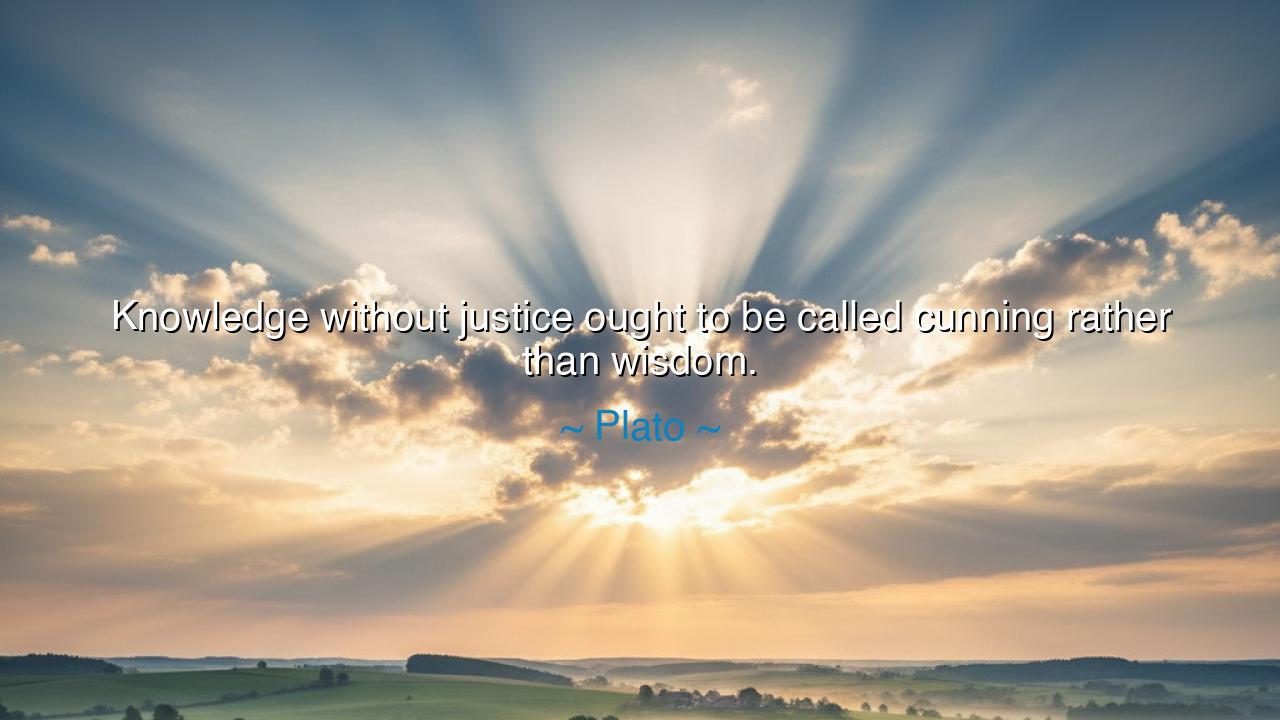
Knowledge without justice ought to be called cunning rather than






Hear now the solemn wisdom of Plato, pupil of Socrates, philosopher of Athens, and seeker of eternal truth: “Knowledge without justice ought to be called cunning rather than wisdom.” In these words, he teaches us that not all learning is noble, not all cleverness is good. For what is knowledge if it is wielded without virtue? What is intellect if it serves only selfish ends? Such things may dazzle the eyes, but they are not wisdom. They are but cunning, the craft of foxes and tricksters, the cold brilliance of a blade used to wound rather than to heal.
The ancients often warned against this false light. Socrates, whom Plato loved, declared that virtue and knowledge must walk hand in hand, for to know what is right and to act against it is not wisdom but corruption. True wisdom is not merely to understand the world, but to align that understanding with what is just, good, and eternal. Without this harmony, the mind becomes a tool of destruction. Thus Plato, gazing into the soul of man, reminds us that knowledge divorced from justice leads only to ruin.
Consider the story of the Trojan War. Odysseus was praised for his cunning, for he devised the wooden horse that breached the walls of Troy. His knowledge of deception brought victory—but also brought death, fire, and the fall of a great city. Was this wisdom? Plato would say no. It was cunning, clever but devoid of justice, a brilliance that shone for a moment but left behind ashes and lamentation. This is the difference between the wise man and the cunning one: the wise builds, the cunning destroys.
History offers darker examples still. In the twentieth century, men of great knowledge harnessed science to create weapons of mass destruction. Their discoveries were magnificent in brilliance, yet when bent to war without the anchor of justice, they wrought devastation upon millions. Knowledge by itself did not make them wise—it only made them dangerous. Without the guidance of virtue, their intellect became a curse rather than a blessing.
Plato’s words are also a call to humility. For it is tempting for men to boast of their learning, to seek admiration for their cleverness. Yet cleverness without compassion, brilliance without fairness, is empty. It may impress the world, but it does not serve the good. True wisdom is clothed not in pride, but in humility, for it recognizes that knowledge is given not for self alone, but for the flourishing of all.
The lesson for us is this: do not strive only to know, but to be just. Let every truth you uncover be guided by conscience. Let every skill you master be used not to exalt yourself, but to uplift others. For if you learn without virtue, you become a clever trickster; but if you wed knowledge to justice, you walk the path of true wisdom.
What then must you do? As you pursue learning, examine your heart. Ask always: To what end shall I use this knowledge? Does it serve justice, or only my pride? Be vigilant, for temptation will whisper to use your gifts for selfish gain. Resist it, and let your intellect serve goodness. In this way, your learning will not merely sharpen your mind but will ennoble your soul.
Thus remember Plato’s words: “Knowledge without justice ought to be called cunning rather than wisdom.” Treasure them, for they teach that wisdom is more than knowing—it is living in harmony with truth and justice. Let your knowledge be guided by virtue, and your wisdom will shine like the sun, bringing light and life to all around you.






AAdministratorAdministrator
Welcome, honored guests. Please leave a comment, we will respond soon